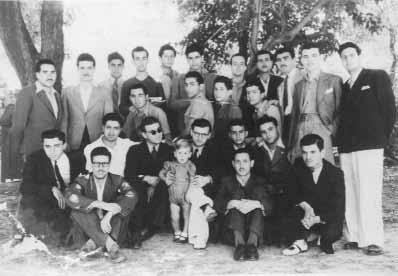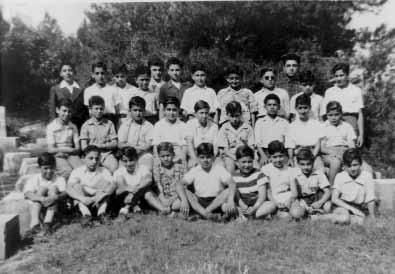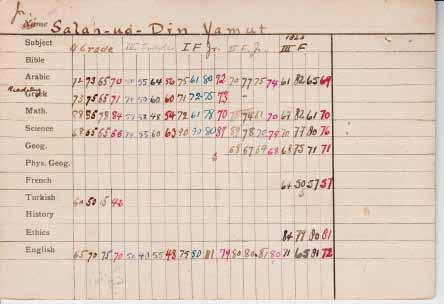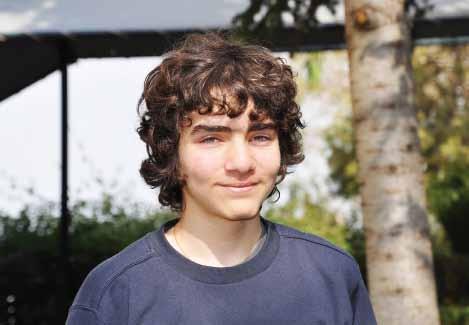
3 minute read
talal’s Law
Never did Zeina Kassem imagine that one day she would be leading a campaign. Never did she imagine that she would be at the forefront of a battle. And never ever did she imagine that this campaign and battle was in honor and memory of her own beloved child. Talal, 17, was on his way to school on October 19th when a speeding car hit him killing him instantly. Since that fateful day, the Kassem family has been lobbying the government to enforce laws that would protect pedestrians. Talal’s death sent shocks of waves throughout the school and community. The shock of his futile death gave way to anger. IF the car was not speeding, Talal would be in class today. IF radars were installed, Talal would be in class today. IF speeding laws are enforced in Lebanon, Talal would be in class today. Clad in black, a thin wisp of her former self, Zeina Kassem struggles to keep the tears at bay. The pain is overwhelming. “Yes,” she said. “Talal would be with us today.” The distraught parents looked for answers. They found none. Instead, they found dozens of confused young faces, all of Talal’s friends, looking at them for guidance. It was then that Kassem knew that she had a new role to play. Talal’s death will not be in vain. “I saw Talal in all of them,” she said. “And I felt – I feel – this need to protect them.” On October 24, just five days after his death, hundreds of people, wearing white and holding banners gathered near the Kassem residence in Ramlet al Baida. They traced Talal’s last footsteps to the Movenpick area where the boy was run down. Hundreds of white balloons were released at the site. The battle for road safety had begun. Current traffic laws in Lebanon are outdated and lag behind other countries. Ironically, the Ministry of Interior, Ziad Baroud, had already completely revamped the law and presented it in parliament. The law was not deemed a priority and until this day remains on the ‘to do’ list. And yet, unofficial statistics by YASA (Youth Association for Social Awareness), state that at least 700 people have died as a result of traffic accidents, and around 10,000 have been injured, since the start of 2009 alone. Outraged IC students gathered at the Serail at Parliament Square on November 25th to urge Speaker Nabih Berri to pass the new traffic law. A petition signed by hundreds was handed in. For a short time after Talal’s death, police could be seen in many corners stopping traffic violators. Radars – that were collecting dust in storage - were pulled out and installed in certain areas. Seatbelts were placed. Red lights were respected. But it was short lived. Policemen eventually disappeared. Radars went unattended. Tickets were rarely issued. Traffic went back to its chaotic norm. Still, Kassem perseveres. “If I can get parliament to pass this law,” she said. “It’s like I did something for Talal. I think this is what Talal wants. To keep his friends safe. I think of it as TALAL’ s law.” Talal’s killer remains in prison. He’s been sentenced to nine months. “And yet,” adds Kassem. “A common thief gets anywhere between seven to 12 years of hard labor.” On January 14, disaster struck again. Mohamed Dimashkieh, 22, - a friend of the Kassem family - was parked at the curb and was getting out of his car when a speeding car ran him over. “We have to put a stop somewhere,” said Kassem. “This has to stop. You just can’t kill people and get away with it. Talal was going to school. That was it. He was just going to school and he was killed. This could happen to anyone.”

Students gather at the Serail at Parliament Square asking for Talal’s law to be implemented
In memory of Talal, an olive tree was planted on campus in January. As Talal’s parents, brothers and sister watched on, friends dug the earth and planted the tree. Another emotional farewell to the “legend of a rebel.”
Zeina Kassem digging in a plaque in Talal’s memory
Highlights of Talal’s Law
n Instilling a pedestrian law – including designating pedestrian crossing points and fining jay walkers. n Strictly enforce all traffic laws pertaining to speeding (including motorcycle violations). Repeated violations are subjected to heavy fines/imprisonment. n Rehabilitate all road signs. n Formalizing driver education classes. n Stricter penalties including appropriate imprisonment terms.












